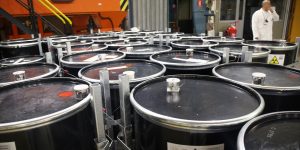The last week of March 2019 saw two days of exchanges on Research and Innovation cooperation between science stakeholders from the Western Balkans and representatives of the EU. The meeting in Sarajevo, Bosnia and Herzegovina – part of a regular format titled ‘Western Balkans Research and Innovation Meetings’ – provided an opportunity to strengthen networks and exchange ideas for enhancing cooperation in research and innovation.
The meeting was chaired by the European Commission and hosted by Ministry of Civil Affairs of Bosnia and Herzegovina. Representatives of the Science Ministries from the Western Balkan Countries (WBC) as well as the EU Commission’s Joint Research Centre, several EU Member States, and international organisations dealing with research and innovation contributed to the discussions. Special emphasis was placed on capacity-building for technology transfer, in particular through workshops, tools and instruments specifically designed to assist academic institutions in the region. Another topic was the design and the implementation of the EU’s smart specialisation methodology – a policy approach that advocates focusing public investment in R&I on a few, carefully chosen priority domains, where the impact on economic and social development is expected to be greatest.
Horizon 2020 in the Western Balkans region
The meeting also served as a platform for discussion on how to strengthen the WBC’s participation in the EU’s Horizon 2020 Framework Programme for Research and Innovation. To date, 343 projects involving researchers from the Western Balkans Six (Serbia, the Republic of North Macedonia, Bosnia and Herzegovina, Albania, Montenegro and Kosovo) have been funded with a total of €85.47 million under the programme. With 35 projects funded, Bosnia and Herzegovina is the third-most successful WBC under Horizon 2020, after Serbia (212 projects funded) and the Republic of North Macedonia (47 projects funded).
One of the most notable success stories of Horizon 2020 funded EU-WBC research endeavours is GeoERA. The project’s goal is to integrate information and knowledge on subsurface energy (for example geothermal energy), water (for example groundwater) and raw material resources around Europe in order to support the sustainable use of such subsurface raw materials. The project includes partners from Albania, Bosnia and Herzegovina, the Republic of North Macedonia and Serbia.
The meeting in Sarajevo is part of a concerted effort by the EU and the WBC to build up research and innovation capacities in the region, bringing the WBC closer to becoming knowledge-based societies, underpinning growth and the creation of jobs, and eventually bringing them one step closer to EU accession. It is also a preparatory activity for the forthcoming Western Balkans Summit in Poznan in July 2019.
Horizon 2020: Open to the World
Horizon 2020 is the largest multinational programme dedicated to research and innovation and it is ‘Open to the World.’ This means that researchers, universities, research organisations or companies from across the globe, including the Western Balkan Countries, can apply to participate in the activities of the Work Programme carried out mainly through calls for proposals. The Work Programme for 2018-2020 represents a major investment of €30 billion, with more than 600 calls for proposals, including a list of 30 international flagship initiatives in areas of mutual benefit. All Western Balkan countries (except Kosovo) are associated to the European Union’s Horizon 2020 Framework Programme for Research and Innovation. Kosovo* can participate in the programme as a third country.
More information:
EU-WBC R&I cooperation Roadmap (2018)



